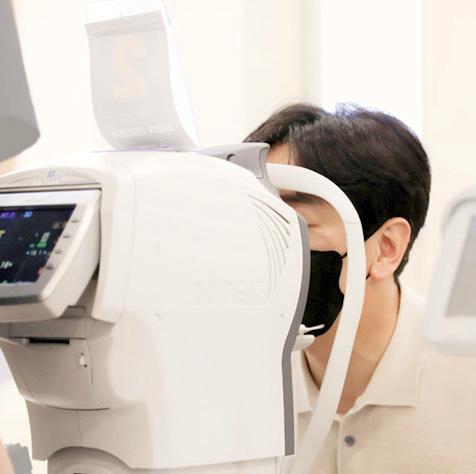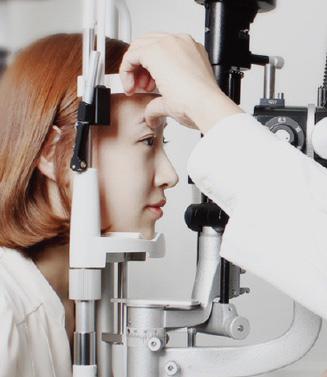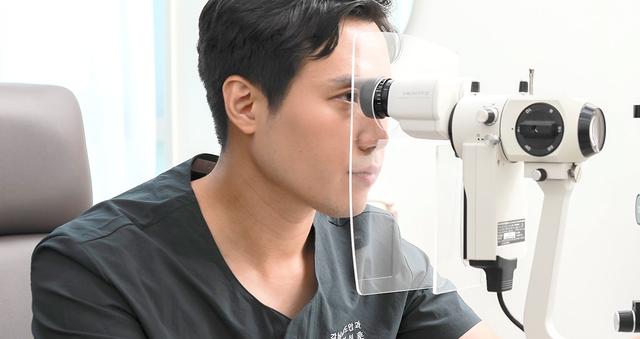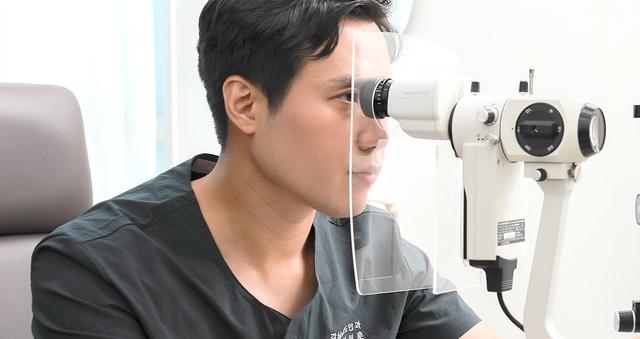Vision Correction
Description
Vision correction procedures aim to improve or restore an individual's eyesight. One common and widely known vision correction procedure is LASIK (Laser-Assisted In Situ Keratomileusis). During LASIK, an ophthalmologist uses a specialized laser to reshape the cornea, the transparent front part of the eye, to correct refractive errors such as myopia (nearsightedness), hyperopia (farsightedness), and astigmatism. The procedure begins with the application of numbing eye drops to ensure the patient remains comfortable throughout. The surgeon then creates a thin flap in the cornea using either a microkeratome blade or a femtosecond laser. The corneal flap is carefully lifted, and the excimer laser is used to remove precise amounts of corneal tissue based on the patient’s specific vision correction needs. Once the cornea is reshaped, the flap is repositioned, and it adheres naturally without the need for stitches. Another prevalent vision correction procedure is Photorefractive Keratectomy (PRK). Unlike LASIK, PRK does not involve creating a corneal flap. Instead, the outer layer of the cornea, known as the epithelium, is gently removed to expose the corneal tissue underneath. An excimer laser is then used to reshape the cornea, similar to the process in LASIK, correcting the refractive error. After the laser treatment, a protective contact lens is placed over the eye to facilitate healing and provide comfort, as the epithelium naturally regenerates over several days. PRK is often recommended for patients with thinner corneas or those who have conditions that make them less suitable candidates for LASIK. Both LASIK and PRK are outpatient procedures that offer significant improvements in vision, leading to reduced dependence on corrective lenses and, in many cases, offering long-term or permanent results.
Search
Related Posts




Top Vision Correction Clinics
Keye Eye Clinic
Seolleung Station
2F, 12F / KEYE EYE CENTER, 326, Teheran-ro, Gangnam-gu, Seoul, Korea
Free consultation from the clinic
**Keye Eye Clinic** in Seolleung offers state-of-the-art eye care procedures with a primary focus on disease treatment based on medical evidence and knowledge. --- **Vision Correction** - **HD SMILE LASIK:** This is a high-density laser vision correction procedure that ensures faster recovery and improves the quality of vision. - **Contour LASIK:** A customized laser eye surgery that corrects vision with high precision based on the unique shape of your eyes. - **Contour LASEK:** Similar to Contour LASIK, but with a different approach that can be suitable for patients with thinner corneas. - **Corneal Strengthening:** A procedure designed to strengthen the cornea and halt the progression of keratoconus. - **Implantable Contact Lenses (ICL):** Surgical insertion of lenses inside the eye to correct vision without altering the cornea's shape. - **Ortho-K (Orthokeratology):** Special contact lenses worn overnight to reshape the cornea and correct vision temporarily. **Presbyopia Clinic** - **Presbyopia Treatment:** Specialized treatments to address age-related difficulty in seeing close objects clearly. - **Cataract Surgery:** Removal of the eye's cloudy lens, replaced with a clear artificial lens to restore vision. **Retina Clinic** - **Macular Degeneration:** Treatments and therapies to manage and slow the progression of macular degeneration, preserving vision. - **Diabetic Retinopathy:** Medical and surgical treatments to control and prevent vision loss caused by diabetes. - **General Retinal Disorders:** Comprehensive care for a variety of retinal conditions, utilizing advanced diagnostic and therapeutic techniques. **Glaucoma Clinic** - **Glaucoma Management:** Continuous monitoring and treatment to manage intraocular pressure and prevent optic nerve damage. **General Eye Disease Clinic** - **Dry Eye Treatment:** Comprehensive care to relieve symptoms of dry eyes and improve eye lubrication. - **Corneal and Conjunctival Diseases:** Treatment for various conditions affecting the cornea and conjunctiva, ensuring overall eye health. - **Lens Dislocation:** Surgical and non-surgical treatments to correct lens dislocation and restore proper vision. --- With cutting-edge technology and a dedicated focus on personalized care, Keye Eye Clinic ensures precise diagnostics and tailored treatment plans for every patient.
learn more
Gangnam Grand Ophthalmology Clinic
Gangnam, Sinnonhyeon, Yeoksam Station
4th floor ,5th floor, 363, Gangnam-daero, Seocho-gu, Seoul, Korea
Free consultation from the clinic
Gangnam Grand Ophthalmology Clinic, located at Gangnam Station, is committed to providing precise and safe eye care treatments using advanced equipment and thorough diagnostics. We guarantee reliable surgeries through our surgery identification system, ensuring high-quality outcomes for every patient. **Presbyopia & Cataract** - **Presbyopia & Cataract Clinic:** Specialized care for patients with age-related vision changes and cataracts. Our clinic offers personalized treatment plans to restore clear vision. - **Multifocal Surgery for Presbyopia:** Involves the insertion of multifocal intraocular lenses to correct vision at various distances. This surgery aims to reduce dependency on reading glasses. **Vision Correction & Dream Lenses** - **Vision Correction Clinic:** Comprehensive services for improving vision clarity through various surgical and non-surgical methods. We tailor treatments to each patient's specific refractive errors. - **EX500 & Contoura Vision:** Advanced laser treatments designed to correct refractive errors such as myopia, hyperopia, and astigmatism. These procedures enhance visual acuity and reduce the need for glasses or contact lenses. - **Implantable Contact Lens Surgery:** Involves the implantation of special lenses inside the eye to correct vision without removing natural lenses. Ideal for patients with severe myopia or those unsuitable for laser surgery. - **Nearsightedness Clinic & Dream Lenses:** Provides solutions for nearsighted individuals, including the use of orthokeratology (overnight) lenses. These lenses temporarily reshape the cornea to improve daytime vision. **Retina & Glaucoma** - **Macular Degeneration Treatment:** Focuses on preventing further vision loss and managing symptoms of age-related macular degeneration. Treatments may include medication and lifestyle changes. - **Diabetic Retinopathy:** Targets the retinal complications arising from diabetes through monitoring and interventions. Early diagnosis and treatment can prevent severe vision impairment. - **Glaucoma:** Comprehensive care for managing intraocular pressure and preventing optic nerve damage. Treatment options range from medications to surgical intervention. - **Floaters:** Diagnoses and manages the presence of floaters in the visual field. Treatment depends on the underlying cause and severity of symptoms. - **Intravitreal Injection Therapy:** Administers medication directly into the eye to treat various retinal diseases. This method is used for conditions such as macular degeneration and diabetic retinopathy. **Eye Care System** - **Comprehensive Eye Examination:** Provides a thorough evaluation of eye health to identify and manage various conditions. This service includes vision tests, eye structure assessments, and diagnostic imaging. - **Dry Eye Care:** Offers treatments to alleviate the symptoms of dry eye syndrome. Solutions may include artificial tears, medications, and lifestyle recommendations. - **Stye Care:** Involves the management and treatment of styes, which are infections near the eyelid. Treatment can include warm compresses, medication, or minor surgery. - **Eye Disease Care:** General care for various eye diseases to maintain optimal eye health. The clinic offers diagnosis and treatment plans for a range of ocular conditions. **Community Services** - **Announcement Board:** Keeps patients informed of the latest updates, news, and events at the clinic. Includes important health tips and clinic announcements. - **Online Consultation:** Provides a platform for patients to seek advice and information about eye health and treatments from our specialists. - **Online Reservation:** Allows patients to schedule appointments conveniently through the clinic’s website. - **Patient Testimonials:** Offers insights into patient experiences with treatments at the clinic, available through a secure access system. The Gangnam Grand Ophthalmology Clinic aims to deliver personalized and high-quality eye care through continuous research and education. We strive to uphold the principles of trust and precision in every treatment we offer.
learn more
Gangnam Joeunnun Vision Clinic
Gangnam, Yeoksam, Sinnonhyeon Station
7th, 9th Floor, 107, Teheran-ro, Gangnam-gu, Seoul, Korea
Free consultation from the clinic
Gangnam Joeunnun Vision Clinic, located near Gangnam Station, offers a variety of advanced eye care and vision correction procedures. **Refractive Surgery:** - **AcuTarget SMILE LASIK:** This minimally invasive procedure reshapes the cornea using precise laser technology to correct myopia and astigmatism. It provides a quick recovery time and minimal discomfort. - **LASIK/LASEK:** Both procedures involve reshaping the cornea but differ in their approaches to the corneal surface. They are popular choices for correcting nearsightedness, farsightedness, and astigmatism with proven safety and efficacy. **Lens Implantation:** - **Implantable Contact Lenses (ICL):** ICL surgery places a custom lens inside the eye to correct vision without altering the cornea. This option is particularly beneficial for those who are not suitable candidates for LASIK or have severe myopia. For more detailed information or to book a consultation, visit Gangnam Joeunnun Vision Clinic's official website to explore their patient stories and service offerings.
learn more
Gangnam Cube Eye Clinic
3F, 5, Teheran-ro 4-gil, Gangnam-gu, Seoul, Korea
Free consultation from the clinic
Located at Gangnam Station Exit 1, our Gangnam Cube Eye Clinic is dedicated to 'a beautiful world visible to the eye, helping you see straight' and strives to ensure that our customers experience no inconvenience. We want to create a space for empathy and communication with our patients to differentiate ourselves from existing ophthalmology clinics in Gangnam. Our skilled medical staff works hard to provide accurate diagnoses and good surgical outcomes. Gangnam Cube Eye Clinic treats and performs surgeries for cataracts, glaucoma, retina, vision correction, dry eye syndrome, and various other eye diseases. We also operate a Dry Eye Center for patients suffering from dryness. With meticulous diagnosis and treatment by our medical staff, and based on careful communication and consideration, we are equipped with the latest examination and surgical equipment to create synergy between people and technology.
learn more
Gangnam Brand Eye Clinic - Gangnam
Nonhyeon, Sinnonhyeon, Sinsa, Gangnam Station
3, 8, 9F, 519, Gangnam-daero, Seocho-gu, Seoul, Korea
Free consultation from the clinic
Welcome to 'Gangnam Brand Eye Clinic', a luxury clinic for healthy eyes. We have a system that does not allow even 0.1% error. Ophthalmologists who convey principles and sincerity gather to protect your eye health.
learn more
Gangnam Blue Eye Clinic
Gangnam, Sinnonhyeon, Yeoksam Station
7th floor Fine Tower, 372, Gangnam-daero, Gangnam-gu, Seoul, Korea
Free consultation from the clinic
**Gangnam Blue Eye Clinic**: Located in Gangnam Station, we offer patient-centered, expert eye care services to help you see a brighter, clearer world. Our experienced specialists use advanced techniques to treat various eye conditions. ### Glaucoma - **Glaucoma Surgery**: This procedure involves techniques to reduce intraocular pressure and prevent further optic nerve damage. It is essential for preserving vision in patients with glaucoma. ### Presbyopia and Cataracts - **Laser Cataract Surgery**: Utilizes laser technology to remove the cataract-affected lens and replace it with an artificial intraocular lens. This advanced method improves precision and recovery time. - **Artificial Lens Implantation**: Involves replacing the natural lens of the eye with an artificial lens to correct vision issues related to aging, such as presbyopia and cataracts. This procedure helps restore clear vision and reduce the dependence on glasses. ### Vision Correction - **LASIK**: A laser procedure that reshapes the cornea to correct refractive errors like myopia, hyperopia, and astigmatism. It offers a quick recovery and significant improvement in vision. - **LASEK**: Similar to LASIK, but involves reshaping the cornea's surface rather than its inner layers. Suitable for patients with thinner corneas or higher risk profiles. - **Implantable Collamer Lens (ICL) Surgery**: Involves inserting a biocompatible lens between the iris and natural lens to correct severe myopia, hyperopia, or astigmatism. An alternative for those who are not candidates for LASIK. - **Orthokeratology (Ortho-K)**: Uses specially designed contact lenses worn overnight to temporarily reshape the cornea for daytime clear vision. Beneficial for managing progressive myopia in children and adults. ### Retinal Diseases - **Age-Related Macular Degeneration (AMD) Treatment**: Various treatments aimed at slowing or stopping the progression of AMD to preserve central vision. This may include medications, laser therapy, or injections. - **Diabetic Retinopathy Treatment**: Includes laser treatments, injections, and surgical options to manage and prevent complications from diabetes-induced retinal changes. Early treatment is crucial for maintaining vision. - **Retinal Detachment Surgery**: Urgent surgical intervention to reattach the retina and restore vision. Techniques may include vitrectomy, scleral buckling, or pneumatic retinopexy. - **Floaters Treatment**: Involves techniques to reduce or eliminate visual disruptions caused by floaters in the vitreous humor. Treatment options can vary depending on severity and discomfort. Gangnam Blue Eye Clinic is dedicated to providing comprehensive and personalized eye care, ensuring our patients receive the best possible outcomes.
learn more
Gangnam Brand Eye Clinic - Incheon
Bupyeong Station
2F, 3F, 32, Sijang-ro, Bupyeong-gu, Incheon, Korea
Free consultation from the clinic
Gangnam Brand Eye Clinic in Incheon is dedicated to providing comprehensive ophthalmic care with a focus on advanced diagnostic and therapeutic techniques. We offer a range of specialized procedures tailored to meet the unique needs of our patients. **Refractive Surgery:** - **LASIK:** This procedure uses a laser to reshape the cornea, thereby improving vision and potentially eliminating the need for glasses or contact lenses. It is known for its quick recovery time and high success rate. - **LASEK:** Similar to LASIK, LASEK involves the use of a laser to correct vision but differs in that it preserves more of the corneal surface. It is often recommended for patients with thinner corneas. **Cataract Surgery:** - **Phacoemulsification:** This procedure involves the use of ultrasound waves to break up the cloudy lens, which is then removed and replaced with an artificial intraocular lens (IOL). It is a common and effective treatment for cataracts. - **Femtosecond Laser-assisted Cataract Surgery:** An advanced method that utilizes a femtosecond laser to make precise incisions and soften the cataract for easier removal. It enhances the accuracy and safety of cataract surgery. **Glaucoma Management:** - **Trabeculectomy:** This surgical procedure aims to alleviate intraocular pressure by creating a new drainage pathway for the eye fluid. It helps prevent further optic nerve damage in glaucoma patients. - **Selective Laser Trabeculoplasty (SLT):** A laser treatment that targets specific cells within the eye’s drainage system to improve fluid outflow and reduce eye pressure. It is a minimally invasive alternative to medication or surgery. **Corneal Procedures:** - **Corneal Cross-linking:** This procedure is used to treat keratoconus by strengthening the cornea with the application of riboflavin and UV light. It helps halt the progression of the disease. - **DALK (Deep Anterior Lamellar Keratoplasty):** A partial-thickness corneal transplant procedure that preserves the patient’s endothelium, reducing the risk of rejection compared to full-thickness transplants. **Retina Treatments:** - **Intravitreal Injections:** Medications are injected directly into the vitreous cavity of the eye to treat conditions like age-related macular degeneration and diabetic retinopathy. This method delivers high concentrations of medication directly to the retina. - **Laser Photocoagulation:** A laser is used to create burns in the retina to treat conditions such as diabetic retinopathy, retinal vein occlusions, and retinal tears. It helps to seal off blood vessels and reduce the risk of vision loss. **Comprehensive Eye Exams:** - **Routine Eye Exams:** Regular eye check-ups to monitor vision health, detect any changes in vision, and prescribe corrective lenses if necessary. These exams are essential for maintaining overall eye health. - **Diabetic Eye Exams:** Specialized eye examinations for diabetic patients to detect early signs of diabetic retinopathy and other related eye conditions. Early detection can prevent serious complications. We strive to provide the highest standard of care through our experienced team and state-of-the-art technology, ensuring that each patient receives personalized and effective treatment.
learn more








